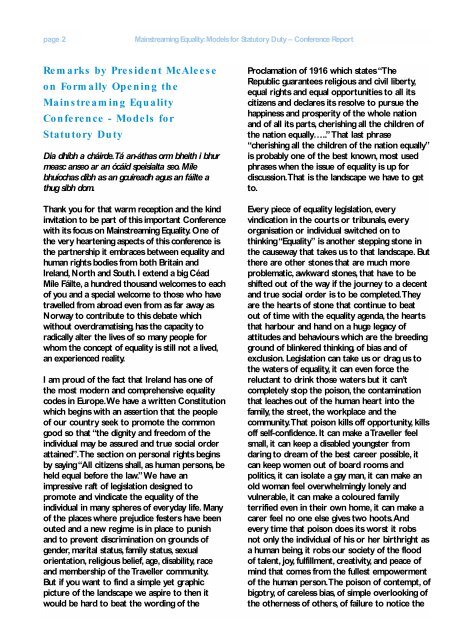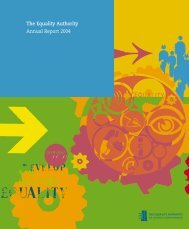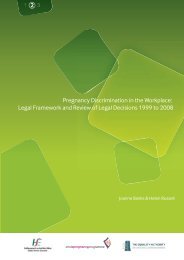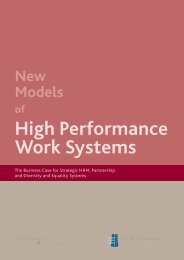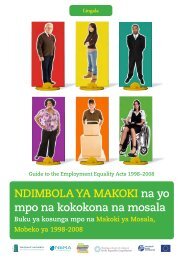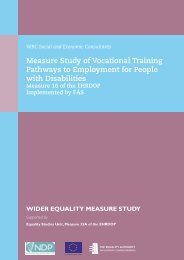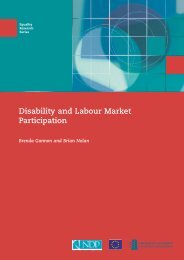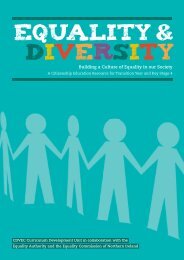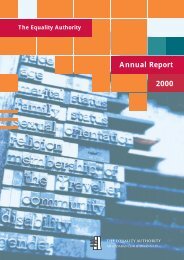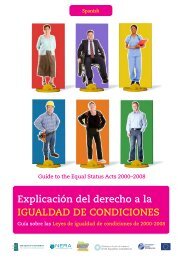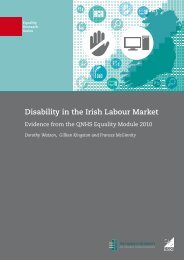Mainstreaming Equality Conference Report.pdf - Equality Authority
Mainstreaming Equality Conference Report.pdf - Equality Authority
Mainstreaming Equality Conference Report.pdf - Equality Authority
You also want an ePaper? Increase the reach of your titles
YUMPU automatically turns print PDFs into web optimized ePapers that Google loves.
page 8<strong>Mainstreaming</strong> <strong>Equality</strong>: Models for Statutory Duty – <strong>Conference</strong> <strong>Report</strong>page 9<strong>Mainstreaming</strong> <strong>Equality</strong>: Models for Statutory Duty – <strong>Conference</strong> <strong>Report</strong>for greater effectiveness. It ensures the policycycle of policy thinking and policy makingcompletes the full circle with policyimplementation.A legal basis ensures quality inapproaches to mainstreaming equality. It makesfor a coherence of approach across a wide rangeof policy and practice areas and allows for acoordination in the proactive pursuit of equality.It ensures standards are applied to the process.It makes the approach a requirement for allrather than the flagship of the progressive few.The EU Gender Equal Treatment Directiveprovides the key rationale with itsrequirements to mainstream gender equality inpublic sector policy and to encourage plannedand systematic approaches to gender equalityin the private sector.While it is early to be in any way definitive aboutthe model for a statutory duty, it is useful toestablish some of the key elements.A legal status tomainstreaming equality should include:-• Clear goals such as realising full and effectiveequality and addressing material inequalitiesbetween certain named groups.• A requirement that approaches tomainstreaming equality should include theparticipation of those who experienceinequality• A role for the <strong>Equality</strong> <strong>Authority</strong>, as anindependent body in establishing, and keepingunder review, standards and approaches to beapplied in mainstreaming equality.• Clear sanctions where there is a failure tomainstream equality adequately andappropriately.Moving ForwardIn concluding it is useful to establish how we canmove forward most effectively to a positionwhere mainstreaming equality is a reality. Inseeking to move forward it is first useful to setout the goals – to establish what needs to beachieved. Six such goals need to be agreed:-• To introduce equality mainstreaming into thepublic sector through equality impactassessments of policies and programmes.• To introduce equality mainstreaming into theprivate sector through equality action plans atthe level of the enterprise• To develop a multi-ground and integratedapproach to mainstreaming equality.Thiswould incorporate gender and the othereight grounds covered by our equalitylegislation. It would integrate an equality and apoverty focus.• To identify and put in place the mostappropriate model for a statutory duty togive a legal basis to equality mainstreaming inthe public and private sectors.• To invest in a capacity for equalitymainstreaming in the public and privatesectors.This would include the developmentof tools to support mainstreaming, training tocreate competencies in mainstreaming and tobuild an awareness of and commitment tomainstreaming approaches. It also entailscreating a wider pool of expertise that can bedrawn on in developing and applyingapproaches to mainstreaming equality.• To develop data gathering and analysis toaddress the significant data gaps that existacross the nine grounds of our equality agenda.In seeking to achieve these goals we need tobuild on the foundations that are already inplace. Four such foundations hold particularpotential.These are:-- The gender mainstreaming work that has beencarried out under the National DevelopmentPlan on foot of EU regulations governing theStructural Funds.The transposition of theGender Equal Treatment Directive should givean important stimulus to this initiative.Thetransposition of the Directive into ourequality legislation should establish a legalbasis for equality mainstreaming in the publicand private sectors. Its transposition should gobeyond the gender ground to include all ninegrounds of the equality legislation inestablishing this statutory duty.- The National Anti Poverty Strategy and thedevelopment of poverty proofing guidelinesbeing applied by the public sector.Theseguidelines already require that particularattention should be paid to inequalities whichmay lead to poverty.The age, gender, disability,race, sexual orientation and Traveller groundsare named.A new Office for Social Inclusionhas now been established which should give anew impetus to the implementation of povertyproofing. One of the tasks of the new office isto develop new guidelines and to tailor themto particular policy areas.This developmentshould integrate poverty and equalityconsiderations in terms of objectives set andin terms of the proofing process established.The new guidelines should provide themethodology for integrated approaches topoverty and equality mainstreaming. Such anintegration is important to ensure theseprocesses are manageable by policy makersand policy making structures that are alreadyover extended.- The work of the social partners.This hastaken place in the National Economic andSocial Forum which has made a number ofrecommendations on mainstreaming equalityand giving this a legal basis. It is also evidentin the National Economic and Social Councilwhich has conducted an important review ofpoverty proofing.This highlighted theimportance of addressing data deficiencies,the need for more streamlined guidelines, theneed for institutional supports and thepotential of an interim staged processtowards integrated equality and povertyproofing. Most importantly the last twonational agreements of social partnersestablished an equality proofing workinggroup.This is convened by the Department ofJustice, <strong>Equality</strong> and Law Reform. It hasproduced a report on equality proofing,established an aspiration that such anapproach have a legal basis and be integratedwith poverty proofing, and developed a rangeof pilot initiatives to develop new learning onapproaches to equality proofing.- The new national agreement ‘SustainingProgress’ by the social partners contains animportant commitment that ‘proofing ofpolicies and services in the public sector toavoid unanticipated negative impact on any ofthe groups protected under the equalitylegislation, to ensure policy coherence andbest use of resources, will build on theexperience of gender proofing under theNational Development Plan, the workinggroup on equality proofing and theexperience of poverty proofing.’ Theimplementation of this commitment shouldinvolve a rolling out across the public sectorof initiatives to mainstream equality in allmajor policy or programme developments.- The work of the National Statistics Board indeveloping a strategy for equality and socialdata.Their report is currently beingconsidered by Government and should leadto the gathering and analysis of new dataacross the nine grounds of the equalityagenda.ConclusionHopefully this paper gives some sense of thepotential in approaches to mainstreamingequality and the importance of a legal basis tothis. Hopefully it also gives some sense of thepotential for change in the current context.Weare moving into a position where we couldbenefit from this new generation of equalitylegislation.The ambition must be to further develop:-• planned and systematic approaches toequality in the workplace.• policy making and practice that acknowledges,accords value to and makes accommodationfor diversity.• a recognition of the persistence ofinequalities and a commitment to full andeffective equality .• evidence based decision making resourced bydata, rather than assumptions or stereotypes.• the social partnership ethos to decisionmaking processes that are participatory andthat include all nine grounds covered by theequality legislation.<strong>Mainstreaming</strong> equality with a legal basis canassist in realising this ambition.We look forwardto contributing to the full development of thisnew approach to equality.Footnote(1) McCrudden, C. 1999. <strong>Mainstreaming</strong> <strong>Equality</strong>in the Governance of Northern Ireland.Fordham International Law Journal 22.


